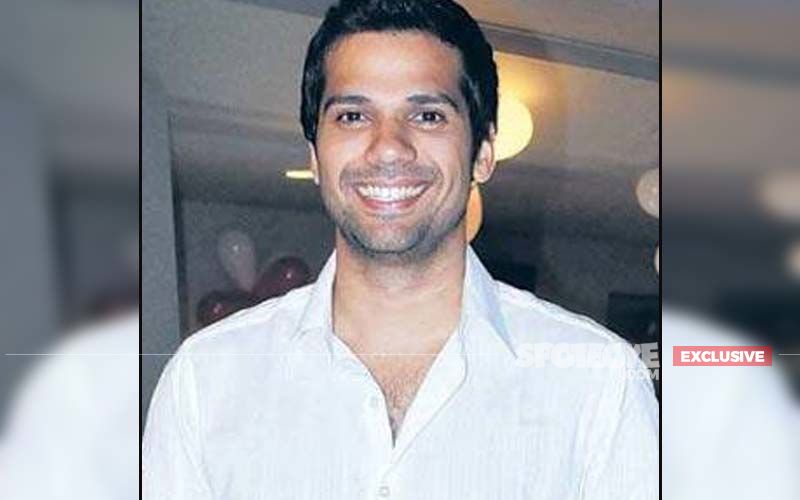Neil Bhoopalam: I Committed My 100 Percent To Acting After I Witnessed The Success Of Dev D-EXCLUSIVE VIDEO
Actor Neil Bhoopalam, who had three successful OTT projects last year, talks about getting professional success in these testing times, his journey in showbiz and being a part of women-centric stories

2020 was a very weird and uncertain year for everyone but for Neil Bhoopalam, professionally, it was an amazing year as he had three releases—The Raiker Case, Four More Shots Please! Season 2 and Masaba Masaba—along with an unforgettable cameo in Vidya Balan’s Shakuntala Devi.
In an exclusive conversation with Spotboye.com, the actor talks about getting professional success in these testing times, his journey in showbiz and being a part of women-centric stories. Read excerpts from the interview:
Neil, did professional success come as a good relief or distraction for you in a time when we were just on the onset of a pandemic that erupted like a massive volcano later?
Yes, it did come as a nice distraction. It was nice to focus on the good things in life and it was my most amount of work that had been released at a time. In the pre-covid world, that would have been a sign to get busier, but as fate had it, it couldn’t happen. Life happens to you.
One of your first prominent roles in Hindi films came with Vidya Balan and Rani Mukerji’s No One Killed Jessica, and almost 10 years later, in 2020 you reunited with Vidya for Shakuntala Devi. How had she changed in all this time?
She still looks the same. As a performer, Vidya Balan is a supreme kalakaar, one of India’s best. I remember even during our time on No One Killed Jessica, we were shooting in Delhi at AIIMS hospital during a night schedule. She wasn’t in that scene that we were shooting at the time, but I was. Still, she went up to the monitor to look at my shot and then came up to me saying that she thought it was a really good performance. It felt really nice that she took the trouble. As a lead actor, you have so much to do but to still be able to be mindful of others around them, is very nice.
There is something about her energy. No wonder why people just adore her. Her personality and her drive are just she being who she is. I just want to give a big thanks to Anu Menon for getting me on board for Shakuntala Devi so that I could work with her again. I have to say that Vidya Balan is the template of a perfect human being and everyone needs to arrive at that level.
Let’s go back 10 years. Tell us how your entry happened into acting.
I am eternally grateful to my theatre director Atul Kumar. At 19, we started doing workshops and theatre was my introduction to acting and it was more than 10 years ago. I was 19 when I started and now, I am 38. Atul saw some potential in me, and eventually I evolved in the media when multiplexes were on a big boom. The time I decided to commit my 100 percent dedication to acting was post Dev D. It made me realise that different kinds of stories can be told. Then, NOKJ and Shaitan kickstarted my journey as an actor.
How have these 10 years into showbiz been for you?
They have been very good. I heard somewhere that being an actor is being a professional human being because our job is to portray human behaviour in the parameters of the story. And now I am just intrigued to see how we go ahead, as the general rhythms of human beings have changed now. What brings you joy and love and how you express it has shifted now. What was once a big deal two years ago, isn’t anymore. Everyone has become a philosopher. So, I am really curious to see how we all evolve now.
10 years into your career, are you content where you are?
When you are in your 20s, you have your dreams that you will become a big superstar like Bruce Lee, but for me, one of my main focus points was that I enjoyed performing. I belonged to the first generation of mass media, so if I wanted to be a professional actor, what I needed to be looking for is consistent work, and I needed to analyse my career in the 10-year format. In those 10 years, if more of your work is on the above average side, it will give you work for another 10 years.
Maths is very important to me now. Earlier I thought being an artist is very esoteric, sort of free-flowing without any structure. But if you follow the last three years, there is a structure to it. There are certain months where there is more work while the monsoon is off season unless you go outdoors or in a studio. Before June and August onwards are two seasons of work in showbiz.
Is this analysis behind you taking a slow pace in your career while choosing projects?
I realised that acting is something I wanted to do even when I am beyond the threshold of being a senior citizen. So, I know there is no rush as long as I keep doing work. I wanted to focus on quality not quantity. And also, these are factors that are beyond the artists. Like right now, there is a massive trend to make thrillers. There are no such comedies being made into series, and even in films, only big players are taking that risk, and it’s a big gamble for them too. But I still feel we are in a good place and I feel as Indians we are very good at making sure that work doesn’t stop completely.
Usually, theatre actors come from a different school of acting with another kind of respect towards the craft. Do you also belong to that school of thought?
Yes, because I learnt my entire craft from the stage, and not just the craft but it also taught me teamwork. It’s like being a sportsperson, you cannot win unless you play as one with your team. As for respect, you are nothing if you don’t have a writer, cameraperson, director to captain the entire thing or producer to put everything up. Immense respect needs to go to each department and when you are on the set, even as a performer, it’s the culmination of all those energies coming together, which is cultivated in that two or three-minute scene.
In your career till now, you have played the majority of supporting characters. Did it worry you at any time that if you keep following that, it might affect the future offers coming your way?
It’s a very valid point and perhaps maybe slightly I thought about it. But having said that, I feel that if I had the same number of opportunities that I had till now, around 15 years ago, I would have had a problem. But in today’s time it works to my advantage as I get to work on a greater number of stories within the same time a lead actor gets to work on one story, which is a great opportunity to work more. So, I get my quota of working days.
You have been a part of strong female characters driven projects, while even till today, several actors would hesitate to be a part of one due to the fear of being overshadowed. Does that fill you with a sense of pride to be that secure?
Yes, I get that sense. But firstly, I feel grateful. When a producer, casting director or the director discuss a project with me that is female-centric and for an integral part of a man in the film, they want to have me on board, I feel flattered because they are choosing me. They have put a lot of thought into their story and who is going to be the face of it and a part of the world that they are creating, and they chose me.
In NH 10, initially I wasn’t sure about doing the film, but then Atul Mongia, the casting director, spoke to me and told me that this was a big project. He suggested that I consider just jumping on board instantly. And after that, there was no turning back. As long as I am busy and my part is on a good canvas, I am okay with doing more such stories.
How do these strong women characters that you surround yourself with, inspire you in real life?
My wife Nandini Shrikent is herself a very strong character, so I am used to having strong women in my life. It just makes you look forward to your work and try to contribute your best as you know you are getting their best. You are receiving their energy, so it’s your duty to try and push yourself and play the best game that you can play.
Image source: Facebook/neil.bhoopalam, Instagram/posterphilia
Image source: Facebook/neil.bhoopalam, Instagram/posterphilia
_2024-12-18-6-32-38_thumbnail_2025-12-18-11-42-19_small.jpg)
